

For more information:

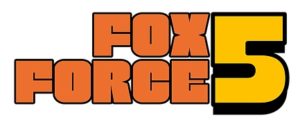
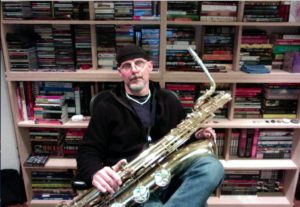
A Facebook entry of the record label Disclosure Records drew our attention to an early release – a Blaxploitation soundtrack to a film called Fox Force 5, which may have been made sometime towards the end of the 70s.
On the website of Disclosure Records you will find a newspaper article about this soundtrack and and the movie.
Unfortunately, neither the author of the article nor the magazine it appeared in is known, which would have allowed us to further investigate this film / soundtrack.
We therefore contacted the head of Disclosure Records to find out more about this release.
James Hart (CEO of disclosurerecords.com) answered in great detail and recommended talking to Steve Sechi. He was the songwriter (with Janice Dempsey) and arranger of the soundtrack album, and also played several instruments on the album.
We contacted and Steve and met him in his studio in Connecticut.
Steve laughed as we told him about our attempt to get information on this release.
Our first question concerned the musicians on the album, who were called Funk Soul Brothers. Parts of this group have been playing together since the 1970s, said Steve.
“We’ve all known each other for a long time. For instance, I’ve been working in bands with the Conga player, Jary Mall, since I was 18 years old. ”
“As far as my music is concerned, I mainly specialize in 60s / 70s funk, soul and jazz. I have a special connection to the 70s because that was when I started to make music professionally as a saxophone player, and later as a writer.
At the time, I also started looking for obscure albums, for ideas, because I just found the music very organic, and alive.
To me, the 70s were musically more interesting. There were so many different types of music, from Motown and Stax to groundbreaking bands with very original sounds.
“One moment you heard Blood, Sweat and Tears, whose style was absolutely new. Then you’d hear an album by Jimi Hendrix, who when I first heard him, I almost fell off the chair. I didn’t know a guitar could sound like that!
Then there was Santana, a band that combined rock and Latin percussion. The music was far more varied than today, as the record labels were different. At the time, you did not know what kind of music you would hear next: Stevie Wonder’s Talking Book album, Marvin Gaye’s What’s Going On, and so many more.
Even the singers were more versatile at that time, today many singers sound the same and have the same style.
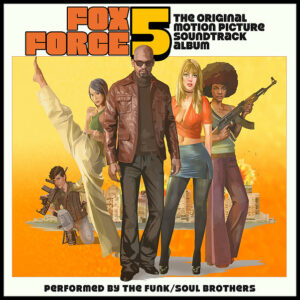
On the older records, you could often hear little mistakes and that’s kind of cool too. Sometimes the musicians or singers were a little out of tune, or they played a little out of time.
There is this James Brown song, I think it was “Superbad”. James “flubs the lyrics in one verse” and simply repeated the verse and left the mistake in. There was no autotune or anything like that back then.
They went more for the “feel” of a song, and didn’t worry so much about the small details.
Blaxploitation movies from the 70s were also a big influence. Though the films themselves weren’t all that good, the music from these movies was great.
I did a lot of research on those soundtracks, and have hundreds of CD’s of music from that era, but unfortunately no vinyl editions.
Fox Force 5 is the only vinyl record I own. ”
When asked how he got involved in the soundtrack to Force Fox 5, there was a long pause.
“I heard about a movie, an unreleased movie with the working title Brother Man. It made me think I would like to do an album like that, so I teamed up with a composer who’d written a lot for various production music libraries. He took me on board, and together we worked on this soundtrack album.
I was given a script, which I also showed to my good friend, the drummer / producer, Joel Rosenblatt. We talked about it, and started recording the project.
I’ve never seen the movie myself, and I don’t know if it really exists.
I believe that the film was never produced. It was the end of the 70s and the era of blaxploitation films was over. Probably the producers simply ran out of money.
Some time later, an animated series called Fox Force 5 was also planned. I don’t know if that project will ever happen, but I hope so.
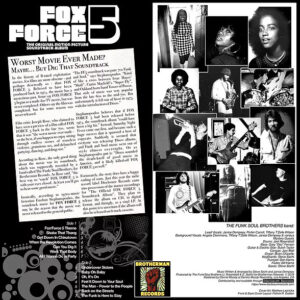
We would like to perform there. But to play the full soundtrack as it is on the album, we’d probably need a minimum of 16 musicians.
4 singers, 5-6 brass instruments plus bass, drums, 2 guitars, 1-2 keyboards and congas. That would be really expensive!
We may perform the album in New York, where there is an organization that sponsors music projects. But getting everybody together for rehearsals wouldn’t be easy, because the musicians we’d want use are always so busy.
But maybe we will do it. And maybe someday an indie producer will make a B-Movie version of Fox Force 5. That would be nice – and if it happens, we have a soundtrack all ready to go!”
There is another video clip next to the trailer called “When the Revolution Comes. The song fits in very well with our time, with the current political situation in the USA. I saw what happened politically here in the 60s and 70s, and experiencing it now again makes me very sad. ”
If you want to order the album, you can order it at https://www.disclosurerecords.com/product-page/the-funk-soul-brothers-fox-force-5. The album is also available streaming services.
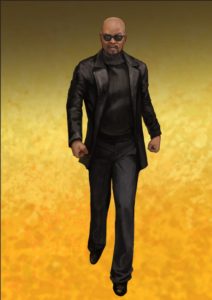
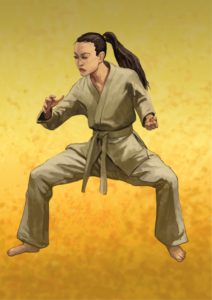
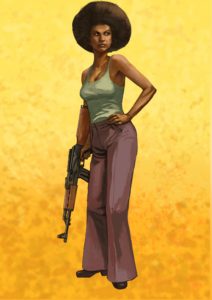
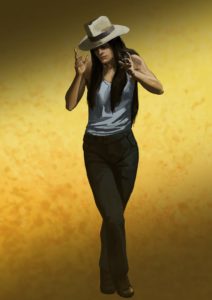


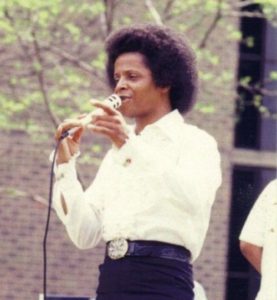 Some time ago, a trailer was introduced to the show, American Soul. In this show, the life of Don Cornelius is portrayed. An important part of this trailer was also the first SoulTrain (national) show from 1971. In the original show appeared next to Gladys Knight & the Pips / Eddie Kendricks / The Honey Cone,Bobby Hutton. However, he did not appear in soul train 40th Anniversary (2011) nor on the TV show American Soul. SoulDisco talked to Bobby in New York why he had no involvement in these events and what happened after his recordings for his only album “Piece of the Action” from 1973.
Some time ago, a trailer was introduced to the show, American Soul. In this show, the life of Don Cornelius is portrayed. An important part of this trailer was also the first SoulTrain (national) show from 1971. In the original show appeared next to Gladys Knight & the Pips / Eddie Kendricks / The Honey Cone,Bobby Hutton. However, he did not appear in soul train 40th Anniversary (2011) nor on the TV show American Soul. SoulDisco talked to Bobby in New York why he had no involvement in these events and what happened after his recordings for his only album “Piece of the Action” from 1973.
Bobby Hutton discovered his love of music at the age of 5, his first great love was Christmas songs.
He tried to sound just like the many artists who sang the songs he loved so much. This love of music accompanied him through school.
After 1.5 years he left college, “the music took over”, he began to sing in small clubs.
His role models were Jackie Wilson, Sam Cooke, Jesse Belvin, Little Willie John. He was often compared to Johnny Mathis “but I was never influenced by him,” Nate King Cole is also not missing on his list. The artist who had the greatest influence on him was Jackie Wilson. Mario Lanza could also be found on his turntable.
“I tried to listen to artists who were in the same vocal range as me, but I did not try to copy them, but to develop my style from their style. We were very poor people, so I had no access to instruments, so I tried to use and perfect my voice as an instrument. ”
When asked if he saw his great idol Jackie Wilson live, Bobby says,
“Yes, I did, I was hired by Billy Davis, who spent his time at Chess Records to replace Bobby McClure, who worked with Fontella Bass. Bobby McClur and Fontella had artistic differences. My first job with her was at the Apollo Theater in New York. My name is Herold Hutton, but Billy made me Bobby Hutton. And since then it has stayed with Bobby Hutton. On the single “Lucky Boy” it is still Herald, but then the name does not appear anymore. Jackie Wilson was the headliner of the show. Fontella was the second act, I was very upset when you’re not good they are throwing tomatoes or other stuff at you, I’ve never sung a duet before. To my relief, the show was a success, we sang “Don’t you mess up a good thing” and “Do not jump out of the skill into the fire”, backstage I met my great idol Jackie Wilson. ”
Fontella Bass is known for her monster classic “Rescue Me” and Bobby’s biggest wish would have been to sing that song with her back then. But the Record Company had plans with her, and other plans with Bobby. She got the better song, Bobby says, she got “Rescue Me” and he got “Lucky Boy”.
“My suggestion was to make” Rescue Me “a duet, but this suggestion was unheard. I was very young and was not very experienced in business. You have to imagine, many of us just came from high school or college and were max. 20 years old. It was “learning on the job” that’s what I would call it. ”
He won a talent contest “20 Grand” in Detroit. And William Mickey Stevenson invited him to Motown, where he met Berry Gordy and made friends with everyone there. The Supremes, like him, were there to record almost every day. One of the first he met there was Marv Johnson, and rumors were circulating that Motown was not happy with him and that Bobby should take his place.
“I met Raynoma (Berry Gordy’s first wife) and we started writing songs together, she invited me one night into her apartment were she lived in with Berry Gordy.
She wanted us to play the song we wrote to Berry, I do not remember the title of the songs, “it must be love” or anything like that, but I never recorded the song itself. ”
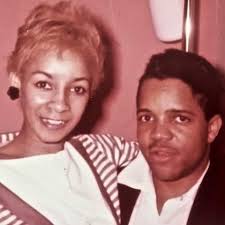
Looking back, Bobby says that the whole situation was funny to him, he says he suspects that Raynoma and Berry had a problem at the time.
Nevertheless, he left the apartment with a good feeling. He was ready to finally pick up material when he went home to his apartment in Detroit that evening.
Barrett Strong and Bobby were friends, and he took him home to Margaret Norton’s (then Berry Gordy’s lover) home and that encounter was to change his entire career.
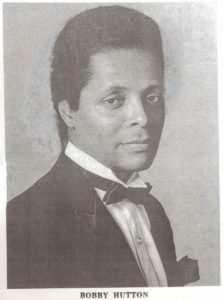
“Margaret had a piano and we were playing something and were flirting ” nothing serious “I did not have a clue that Margaret was in a relationship with Berry.
A DJ Convention some time later should change everything. We were all in Berry’s office and suddenly Margaret is in the doorway with Berry. She turns to me and says “Tell Berry you said you love me,” and believe me I never said that to her.
I swear this on a stack of Bibles that it was not like that, I may have flirted with her but I have not seen her either before or after.
I was so embarrassed that I just left. At that time, I shared an apartment with Robert Bateman, who was the recording engineers at Motown.
And he told me one night that Berry was not good at talking to me. I did not have a strong connection to Berry, nor was I able to stand my man and go to Berry to tell him that it was not the way Margaret said.
I just went to build something new in Chicago again. In retrospect, I think everything was a game I fell by the wayside. Raynoma knew about the relationship between Berry and Margaret and wanted to make Berry jealous.
Today I would like to talk to Berry and tell him that it should not walked out of the situation and that I should have acted differently then.
But I was young and naive.
My start at Motown should have warned me. If you went into the building back then, there was a walk to the first office, there was a picture of Berry, it fell off the wall the moment I passed the picture and hurt my arm. Raynoma and Micky had to take me to the hospital so I could be sewn. I just think that it was already an omen then.
The contract with Motown would be very important to me today because Motown wanted all the rights to me, singing, songwriting and management. I’m not sure that this was legal. In my opinion, you cannot have so many parts of an artist. I see it as an experience how not to do things.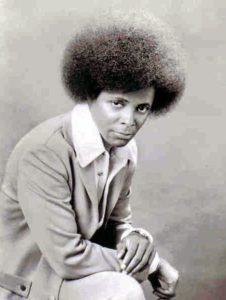
These contracts did not bring much money to the artists, but to those who were “in charge”.
Most of these contracts were designed to tie an artist to the label for many years. Since Motown could not take care of everyone due to the large number of artists, many fell by the wayside.

It also means that they could not record for many years with anyone else, as the contract clearly forbid.
I was suggested by Melvin Franklin to become part of the Temptations, at that time the idea was very strange to me. That’s why I turned it off.
After Motown, I tried to my luck with the group “The Capitols” and get a contract with them on the James Brown label Kind Records. ”
When asked how he wanted to work for another label while working for Motown, Bobby says.
“It should not be. “But I would not let anybody stop me,” says Bobby.
“I never got a written release note from Motown”. The tragic thing is, you’re young, you want your music to be heard and move forward.
As you sign these contracts in the belief that everything is in your best interest.
And it happened to so many artists, you need an agent and you have to be careful that it’s fair and honest.
Then there is an agency that wants to have money.
You take in $ 100, your manager charges 15% and the agents charge 30% and then you have to pay the band that works for you.
There is not much left for yourself.
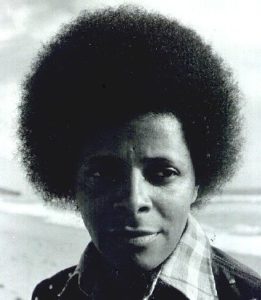
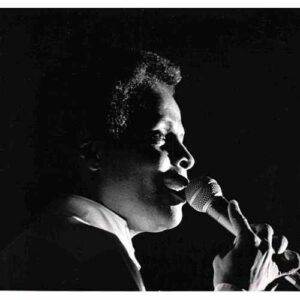
You do not even think about that when signing a contract because you have no idea about the business.
After my time with Fontella, I worked in the local clubs in Chicago, where nobody knew who I was. I worked very hard to feed my family. I sang 6 nights a week except Sundays and learned all kinds of songs. I did that for years until I got a new contract with Philips Records. There I recorded some Northern Soul classics, including “Come See What’s Left of Me” and “You’re My Whole Reason.”
With the last song he was one of the artists who were in the first national broadcast of Soul Train.
“After 50 years, you look back on your life and see” the good the bad and the ugly “you have to accept it as it is and also if you wish that many things might have gone differently.
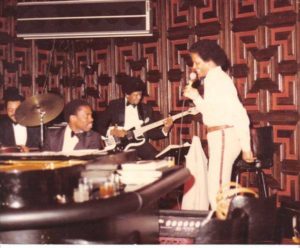
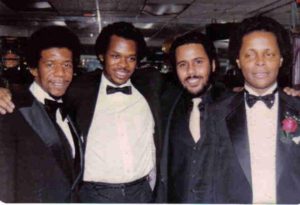
I have a song on YouTube 20 Years later, which will have over a million views in the next few days. And you know, what really bothers me is the fact that this song is never played on the radio, even though it’s so popular.
Today, people come to your music so fast, they hear you and do not even have to pay for it in the case of YouTube. Had the song been released 20 years ago, with the appropriate promotion, it could have become a 2 million seller.
Therefore, the situation today is “bitter sweet” for me.
The song “You’re My Whole Reason”, which I sang on SoulTrain, was recorded in my twenties, and in 2017 I recorded a new version and I can still sing that song in the same key as the original. If you invited me to a talk show, etc., I could sing the song the same way I did in 1971.
I think my appearance on SoulTrain has helped make the show a 7-year contract with CBS.
It all started in Chicago, I already had some hits here “That’s how heartaches are (1968)”, I never had a real connection to this song, I just did not like the sound, “Come see what left of me (1969) “,” More today than yesterday “, they were all in the top 5. 1970 then followed by a bigger hit” I cannot stand a woman to timing a man, “which was then played throughout Chicago.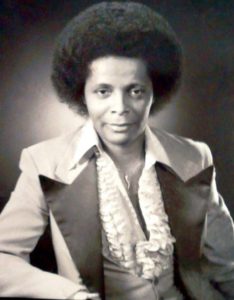
You know, SoulTrain has been here in Chicago since 1970. It was a 5-day show, with Jerry Butler, The Emotions and The Shirley’s on the first shows. Since they were on tour a lot, Don needed someone to take the spots in his show. And the only one who came into question at this time from Chicago was me. So, you have to imagine that of the 5 shows in the week, I was at least in 3. Of course, this increased my notoriety in Chicago. I was the “Hottest Act in Chicago” at the time. Unfortunately, there are no more tapes from the time of the local shows. The studio for the local broadcasts was very small “20 by 20”. The program ran 52 weeks a year, 5 days a week. At the time, Donny Hathaway was writing a song for me, as it was clear that I would join the pilot in the first nationwide broadcast on SoulTrain alongside Gladys Knight & the Pips / Eddie Kendricks / The Honey Cone. The song was called “Your my whole reason”.
Live was not sung, all I had to do was lip-sync to the recorded songs.
When we arrived in California, director Mark Warren came to Don and alluding to me, he becomes a big star.
I think Don felt a bit offended at that moment. That did not get any better as Mark stopped by at our hotel “to hang out with me”. I did not do anything behind Don’s back or anything. Basically, I was a victim of the circumstances. I did not want to anything away from Don, I was just so proud to be there.
After the broadcast, the Chicago Defender (October 30, 1971) wrote “Bobby Hutton featured on SoulTrain.” Not a word from Don or Gladys Knight. I did not know anything about the article or anything, but you can imagine that the relationship between Don and I was at its lowest. I never went back to SoulTrain after that and my best-known records came out after that. If I had been on SoulTrain with it, my career would have been different.
This was the second time that interpersonal disagreements have led to me not being able to get started. ”
The recordings after SoulTrain include his only studio album, Piece of Action so far. E. Rodney Jones, was at that time, secretly managing him and brought him to ABC. “He always said that when the right song comes, I would be a superstar, bigger than Johnny Mathis. Unfortunately, E. Rodney had a dark side, dealing with drugs and all these things. And I was very worried about my career. He gave me a release from my contract and at the same time he made sure that my records at the radio station were not played anymore. And that was it then.


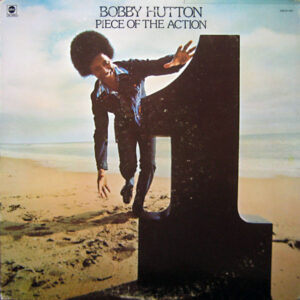
“Can`t get enough” and “Until I see you again”, these were the only songs that I influenced on when recording my album. These songs were written by Larry Wade and Terry Callier. Charles Stepney took care of the music of Earth Wind & Fire, and wanted me as an artist. I absolutely wanted him as my arranger for my album, but since ABC did not really know him, they took Dee Ervin.
And these two songs were Charles Basic arrangements that I was able to enforce. And when you hear these songs, you can see in which direction Charles wanted to take me, it was pop and R & B. These two songs were actually written for the Dells. Today I do not have to say anything about Earth Wind and Fire, Charles has made then one of the most famous groups.
It is a pity that at the time that ABC did not trust me about Charles.
I knew Charles because I recorded Coca-Cola advertisements with him, and I earned a lot of money with it for a while. ”
“There were many reasons for that, one of the main reasons was my break with Rodney Jones and then I was on my own. Without a manager, you have trouble getting a new contract and I had a family to feed. And so, the years went by until the UK rediscovered me.
I did have follow up Single by 1974 “loving you, needing you, loving you, wanting you” and “watch where you’re going” as the b side on ABC, but after Rodney stopped all the promotion it went nowhere for me.
I have to say that these songs are great and back then it was a shame that were not promoted/played the way they should have.
https://youtu.be/VYmPGuIMGs0
In Europe, you appreciate good music and there I was rediscovered in the 80’s. Since then I play on soul weekenders. The UK has saved my career. Without the distribution of my music in the Northern Soul scene, we would not speak today. ”
Bobby performs regularly in front of a large audience in Europe and his songs are not only popular in the Northern Soul scene.
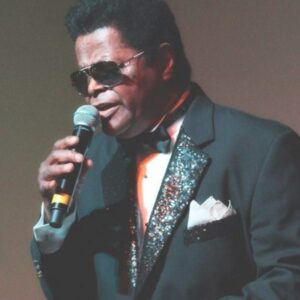

Why he was excluded from the 40th Anniversary celebration and the TV series remains a mystery that we will not solve here, because Bobby cannot explain it to himself. But it also remains a bitter taste to exclude an artist of the first hour, who was also able to contribute quite a bit to the local show before the National Soultrain Show was even considered.
Bobby loves his fans and thanks for the long time of loyalty.
Would he do things differently today? Yes, for sure. But at the end of the day he has a conciliatory view of his career, which is characterized by many ups and downs.
Get in touch with Bobby:


Once a member of Philly-soul group First Choice. In 1979 she recorded a self-titled album with producers John H. Fitch, Jr. and Reuben Cross, who co-wrote Evelyn King’s “Shame”, on Midsong International Records. The album included “Super Sweet,” which went to number 20 on the R&B charts and “Captain Boogie,” which went to number 33 on the R&B charts in early ’79.
Music by Wardell
For more Information: https://www.discogs.com/artist/122141-Wardell-Piper

Danny Pearson (January 6, 1953 – August 17, 2018) received attention at the end of the 70s with his only album “Barry White Presents Mr. Danny Pearson”.
SoulDisco conducted a telephone interview with the then 63 year old in 2016. Unfortunately, a final article could never be completed due to Danny’s severe illness. It was very important for us that the story of Danny would be told anyway, by himself in his own words. The recording you hear was made on the occasion of the telephone interview, and was never originally intended for publication. Therefore, the audio quality is not optimal. We are grateful, his family for approving this interview to be released.
The lead single from his only album, “What’s Your Sign Girl?”, peaked at #16 on the U.S. R&B charts and at #106 on the Billboard Bubbling Under Hits. At the time of his death, he was in the process of recording a new album. As far as we now these recordings are not supposed to be released any time, soon.
Music by Danny Pearson

Little is known about the band Moment of Truth, their only album from 1977 enjoys great popularity among soul and disco connoisseurs on both sides of the Atlantic. The group, which unfortunately was to record only one album, consisted of Norris Harris, Ivery “Caprice” Bell, Michael Garrison and Billy Jones. 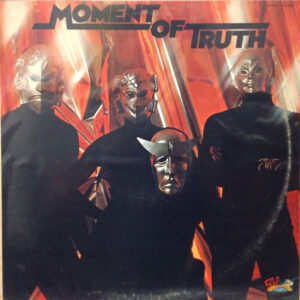 The producer Reid Whitelaw writes in the liner notes “Moment of Truth is an album about the desire for love”. From the introductory song “Chained to Your Love” to the last song of the B-side “So Much for Love”this statement proofs to be true.The label Salsoul Records is better known for their “disco-heavy” releases, but Moment of Truth is more of an “uptempo soul concept” album. Since there is so little information about this group, we located and interviewed one of the lead singers of the group Ivery “Caprice” Bell in New York.
The producer Reid Whitelaw writes in the liner notes “Moment of Truth is an album about the desire for love”. From the introductory song “Chained to Your Love” to the last song of the B-side “So Much for Love”this statement proofs to be true.The label Salsoul Records is better known for their “disco-heavy” releases, but Moment of Truth is more of an “uptempo soul concept” album. Since there is so little information about this group, we located and interviewed one of the lead singers of the group Ivery “Caprice” Bell in New York.
Ivery is not surprised that Moment of Truth are in Europe and even in Japan floor fillers in underground Discos. “I know that the releases of ‘Lovin’ You Is Killin’ Me’,’You got me hummin ‘and a few others have often been played, and what we have always regretted is the fact that we never had a chance to perform in Europe.” Ivery started singing at the age of 8, his first appearance was at no other location than the Apollo Theater in Harlem. The famous talent competitions that have produced the Jackson 5, among others, are legendary. Among a large number of first-class singers, he won the first place. “That was the wake up call for my family that I had great talent.
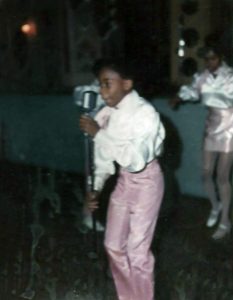
“At some point I put together my own group, so to speak my own Jackson 5 version. We then performed at parties and talent competitions.” Devoted to his music career, Ivery quit his job and set off each day for New York City to search for jobs that required singers.”I knew I had talent, but I was not sure if I should do it professionally, but I definitely wanted to try it.”The Village Voice newspaper has always been there to help him find vocal jobs. He discovered a display of the Studio Sound System 6, which was looking for singers. Ivery went to the audition with a friend and was selected for the group that was to be named ACE SPECTRUM. The group later had a hit with “Do not Let Me Be Lonely”. Reid Whitelaw, the auditor in charge, however, alerted Ivery to another group, Moment of Truth. “Moment of Truth was the baby of Reid Whitelaw, he had musicians recording in the studio, but no real group performing. Therefore, he was very interested in finding singers. At this time, Ivery and Norris, who were already working on the Moment of Truth tracks, met.”
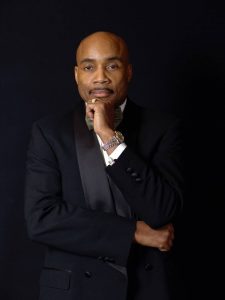
“We held auditions ourselves at that time to find more members for the group, we chose Michael Garrison. We invited Billy Jones to get an impression of the group in the hope that he will also become part of the group. He was the ideal cast because we were looking for a singer with a “heavy and rough voice”. Billy, I knew from other groups where we sang together. In this formation, we then sang in front of Reid who took us immediately under contract “. Reid took the group to Ken Cayre, one of the founders of Salsoul Records, and we sang the track “Helplessly” in his apartment. That was the official birth of Moment of Truth, as Ken immediately signed us up for Salsoul Records. This time was terribly exciting for the then 19-year-old Ivery, everything seemed to be possible. “I’ll never forget the moment when I first heard myself sing on tape in the studio. Of course you are still nervous at the beginning, but after the second take, i felt comfortable. The duet between Billy and me “You’re All I Want To Be” will always be remembered as another highlight. To this day I just love this song “.
He is still in contact with Billy and is thinking about re-recording the song as many people still request this song to him. Ivery does not know why the cover pictures where changed in the European versions of the album as opposed to the US version. He thinks it’s very funny. There are many versions of their songs on the internet, and every time Ivery is surprised how creatively people deal with their music and what new remixes emerge.

When asked if there are still unreleased songs from that time, Ivery says, yes. He remembers the song “Spreading Myself Too Thin”, which he wrote himself. It was a ballad not an uptempo song and was written in 1983. “We’re thinking about finally releasing this song, it would be a good idea to do it as we’re back as part of a very successful disco reunion show.
Therefore, one can say Moment of Truth are back. I reunited the group for a reunion show, which took place last October at Resorts Casino NY. In addition to Tavaris (which also regularly occur in Holland), France Jolie (Come to me) and many other Well-known artists from the disco area.” We are already talking to some agents in order to continue to make a comeback.
Incidentally, we also learns that Moment of Truth also played in a then-popular Blaxploitation movie, on the soundtrack you will find greats like Gloria Gaynor and Vicki Sue Robinson. 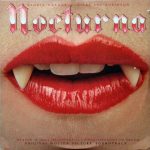
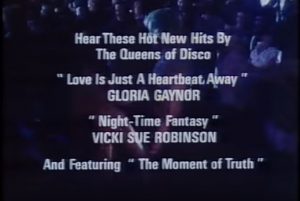 NOCTURNA is the name of the vampire movie from 1979. They also contributed two songs to the soundtrack, “Love At First Sight” and “I’m Hopelessly In Love With You”. The in-disco STARSHIP DISCOVERY 1 in Manhattan served as a location for many scenes from the film. (https://sites.google.com/site/cultoddities/home/nocturna/filming-locations) But shortly after the shooting differences within the group and the management stared. “We just wanted to have more influence on our music, also in terms of writing songs. We simply could not agree with the management, so we retreated and everyone moved in a different direction. ” When asked why there was no way for a follow-up album of the first album, Ivery laughs and says “politics” As far as Ivery is aware, producers Joe Cayre, Ken Cayre and Stan Cayre wanted to be involved in the group through a “personal ownership interest”. The inventor of Moment of Truth, Reid Whitelaw was of course not enthusiastic about this proposal. This led to a break from which the group should not recover. We were already in the preparations for a second album, as the label did not want to invest in the group due to these clashes. The debut album also sold very well in Europe and Ivery regrets that they never had the opportunity to perform in Europe.
NOCTURNA is the name of the vampire movie from 1979. They also contributed two songs to the soundtrack, “Love At First Sight” and “I’m Hopelessly In Love With You”. The in-disco STARSHIP DISCOVERY 1 in Manhattan served as a location for many scenes from the film. (https://sites.google.com/site/cultoddities/home/nocturna/filming-locations) But shortly after the shooting differences within the group and the management stared. “We just wanted to have more influence on our music, also in terms of writing songs. We simply could not agree with the management, so we retreated and everyone moved in a different direction. ” When asked why there was no way for a follow-up album of the first album, Ivery laughs and says “politics” As far as Ivery is aware, producers Joe Cayre, Ken Cayre and Stan Cayre wanted to be involved in the group through a “personal ownership interest”. The inventor of Moment of Truth, Reid Whitelaw was of course not enthusiastic about this proposal. This led to a break from which the group should not recover. We were already in the preparations for a second album, as the label did not want to invest in the group due to these clashes. The debut album also sold very well in Europe and Ivery regrets that they never had the opportunity to perform in Europe.
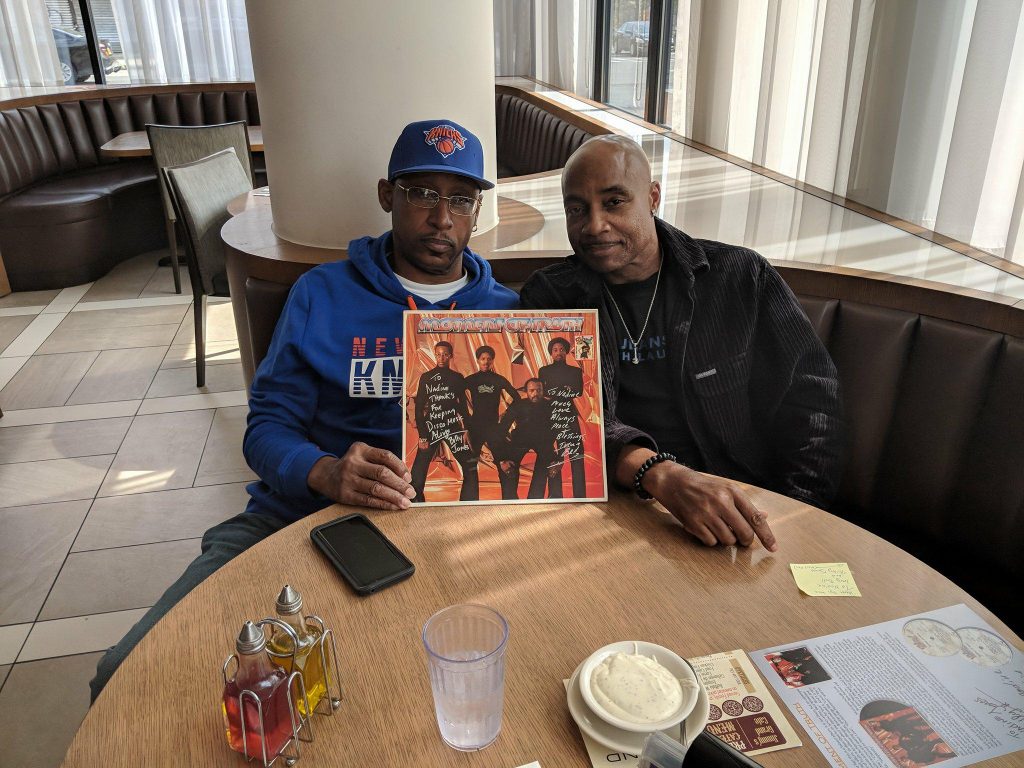
“One of the big problems we had was that we were approached at concerts by many managers and producers who would have loved to work with us, but unfortunately, because of our contract, our hands were tied”. And it was not just concerts in discos, at the height of their short career, Moment of Truth played at Madison Square Garden. 
 At the premiere party of the film Saturday Night Fever, whose influence is still present today and characterizes the image of the Disco Area, they performed that evening in the Disco Odyssey 2001 in Brooklyn, which were also the filming location of the film. There they were, next to Sister Sledge one of the “Main Acts”.
At the premiere party of the film Saturday Night Fever, whose influence is still present today and characterizes the image of the Disco Area, they performed that evening in the Disco Odyssey 2001 in Brooklyn, which were also the filming location of the film. There they were, next to Sister Sledge one of the “Main Acts”.
Soon after, Billy and Michael left the group, and then a new member arrived. Michael later came back to the group, but the moment of the group was just gone. After “Moment of Truth”, Ivery has been very focused on Gospel and released a lot of Gospel material along with O’Jays producer Dennis Williams. He also produced “Spreading myself to thin” in the early ’80s.
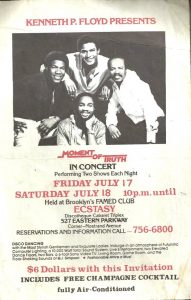
One day, Darryl Payne called him to alert him to the group Blue Magic. The group was looking for a new lead singer and they felt that his voice fit best with their material. He accepted the job and was for several years the lead singer of the group Blue Magic. “You must know there are several groups of Blue Magic. In between, I joined the Delfonics to sing again in another Blue Magic group. I did that for about 10 years. ” Since October of this year he is again very successful with his gospel material on tour and he has at least 40 appearances with a Motown revival group a year. Incidentally, he still finds the time to bring Moment of Truth back together. Ivery is a friend of Reid Whitelaw, who helps him to rebuild his plan of Moment of Truth. Unfortunately, it is no longer possible to rebuild the original line up. Michael Garrison died a few years ago. Norris Harries is also no longer available, as he has a hotel in the Caribbean. They do not earn money on the album, and Moment of Truth also meets the fate of so many artists who signed contracts that were not in the main interest of the artist. Especially in view of the fact that the album was released in many countries and several times on CD, this fact hurts a lot. “First and foremost, we made money from the concerts. For the Movie we were paid for the shooting days, but we were not involved in either the soundtrack revenue or the box office earnings. Today it would not happen to me anymore, but at the age of 19 you were just very young and very naive.” For Ivery it is very important that the fans know that Moment of Truth is back and only looking for a promoter, so that they can finally appear in Europe. He thanks the fans for their support over the years.
SoulDisco can exclusively present some snippets of the never released songs from 1983.
Bonus:

 After some attempts to get in contact with Gwen, we finally got in touch and she was more than surprised that Hot and some songs are still very popular in the soul / disco scene. Especially in the UK, Hot is a perennial favorite.
Asked when the fans can expect a release of HOT’s three albums on CD, Gwen says, “The material is at Atlantic and it’s up to them whether the albums are released on CD or not.”
Unfortunately, all outtakes and tapes from this session are no longer available. Producer Terry Woodfort eventually decided to destroy them, as the storage of the tapes in the respective rooms was simply too costly. That means, the only remaining master tapes are in the archives of Atlantic, so at least one hopes.
After some attempts to get in contact with Gwen, we finally got in touch and she was more than surprised that Hot and some songs are still very popular in the soul / disco scene. Especially in the UK, Hot is a perennial favorite.
Asked when the fans can expect a release of HOT’s three albums on CD, Gwen says, “The material is at Atlantic and it’s up to them whether the albums are released on CD or not.”
Unfortunately, all outtakes and tapes from this session are no longer available. Producer Terry Woodfort eventually decided to destroy them, as the storage of the tapes in the respective rooms was simply too costly. That means, the only remaining master tapes are in the archives of Atlantic, so at least one hopes.
 Gwen started singing in high school. “There was a sponsorship program in which I sang. Someone who sponsored this program was also recording in a recording studio and asked me what I did after school. I told him nothing and he just said, very well, then you can come to the studio after school. “The first recording was” Mystery of Love “followed by” Mystery Man “(1964). After that there was “Just Say You Wanted (And Needed)” and “I lost a good thing”. All songs are still very popular in the Nothern Soul scene.
At the beginning of her career she only sang songs by male singers, like Wilson Pickett and Otis Redding, because she did not want to be compared to other female singers. “Just to avoid anyone telling you, oh your sound is like that of singer X or Y. As female role models, I had Aretha Franklin, Tina Turner, Etta James, and Gladys Knight. I covered a lot of James Brown, my favorite song was cold sweat.
My cousin and sister were my backup dancers in my performances. We had this one gig in a club and I wore high heels and danced like crazy. Suddenly I slipped and during the next beat I was back up again. Of course, people thought it was part of my performance, why would a woman dance like this with high heels in a very long dress on a slippery floor? It was unbelievably fun for those who knew it was not part of my show. ”
The single “Rain” / “Lies”, which is in many lists stated as a single led by Gwen Owens, was not sung by her. “Weldon Mcdougall who has released the song must have made a mistake,” says Gwen. “It’s definitely not my voice, unfortunately now the whole world thinks the single is mine, which it definitely is not. There are so many songs I have recorded over the years and many songs that I can not remember … But I can clearly say that it’s not my voice. I do not know who the woman is and if she is still alive, but I certainly do not want any credit for songs I did not record. ”
In 1968 she recorded the singles “Make him mine” and “One more day”. Followed by more singles she recorded until she moved to California in 1971. “That’s where I recorded at Muscle Shoals Studios, where I also met producers Clayton Ivery and Terry Woodford, who also produced my song” you better watch out “. Clayton tried to sign me with a label when he suddenly got a call from Motown. He asked to build Motown South together with Terry. And when he signed up with Motown, he suggested me as an artist and I was in it. I insisted, however, that my contract only lasted over 6 months. Motown had a habit of contracting artists for 7 years and then doing nothing with them. And you can not record for anyone else, since you have a long-term contract with Motown.
Gwen started singing in high school. “There was a sponsorship program in which I sang. Someone who sponsored this program was also recording in a recording studio and asked me what I did after school. I told him nothing and he just said, very well, then you can come to the studio after school. “The first recording was” Mystery of Love “followed by” Mystery Man “(1964). After that there was “Just Say You Wanted (And Needed)” and “I lost a good thing”. All songs are still very popular in the Nothern Soul scene.
At the beginning of her career she only sang songs by male singers, like Wilson Pickett and Otis Redding, because she did not want to be compared to other female singers. “Just to avoid anyone telling you, oh your sound is like that of singer X or Y. As female role models, I had Aretha Franklin, Tina Turner, Etta James, and Gladys Knight. I covered a lot of James Brown, my favorite song was cold sweat.
My cousin and sister were my backup dancers in my performances. We had this one gig in a club and I wore high heels and danced like crazy. Suddenly I slipped and during the next beat I was back up again. Of course, people thought it was part of my performance, why would a woman dance like this with high heels in a very long dress on a slippery floor? It was unbelievably fun for those who knew it was not part of my show. ”
The single “Rain” / “Lies”, which is in many lists stated as a single led by Gwen Owens, was not sung by her. “Weldon Mcdougall who has released the song must have made a mistake,” says Gwen. “It’s definitely not my voice, unfortunately now the whole world thinks the single is mine, which it definitely is not. There are so many songs I have recorded over the years and many songs that I can not remember … But I can clearly say that it’s not my voice. I do not know who the woman is and if she is still alive, but I certainly do not want any credit for songs I did not record. ”
In 1968 she recorded the singles “Make him mine” and “One more day”. Followed by more singles she recorded until she moved to California in 1971. “That’s where I recorded at Muscle Shoals Studios, where I also met producers Clayton Ivery and Terry Woodford, who also produced my song” you better watch out “. Clayton tried to sign me with a label when he suddenly got a call from Motown. He asked to build Motown South together with Terry. And when he signed up with Motown, he suggested me as an artist and I was in it. I insisted, however, that my contract only lasted over 6 months. Motown had a habit of contracting artists for 7 years and then doing nothing with them. And you can not record for anyone else, since you have a long-term contract with Motown.

 We did not search for material, but had recorded other songs besides “you better watch out”. The were completely finished and would only have to be published. The problem with Motown, however, was that they had so many artists with so much material that they did not even manage to release my stuff. So, after 6 months I asked to be released from my contract. At that time, Ivery and Terry were still under contract with Motown South. The Motown South Project did not really do anything.
When their contracts extradited to Motown, they called me and asked if I did not want to come back and I said to myself, why not. At that time, they brought my songs to Casablanca and Casablanca signed me. Finally Casablanca released “You better watch out”.
When asked what happened to the rest of the songs, Gwen laughs. “I have no idea, you know, I’ve recorded so many songs over the course of my career, eventually you lose track.”
Producer Terry Woodford still remembers a title “Cross My Heart” which was also recorded by Gwen but never released..
After the release of “you better watch out” it got quiet, concerned Gwen`s solo recordings. “I worked as a background singer for Ann-Margret, Jose Feliciano, the O’Jays, Lou Rawls, Nancy Sinatra and Raquel Welch, among others.
Ivery came back to me in the mid 70’s, so I did the backing vocals on the Wolfman Jack tour with Cathy Carson and Irene Cathaway.
We did not search for material, but had recorded other songs besides “you better watch out”. The were completely finished and would only have to be published. The problem with Motown, however, was that they had so many artists with so much material that they did not even manage to release my stuff. So, after 6 months I asked to be released from my contract. At that time, Ivery and Terry were still under contract with Motown South. The Motown South Project did not really do anything.
When their contracts extradited to Motown, they called me and asked if I did not want to come back and I said to myself, why not. At that time, they brought my songs to Casablanca and Casablanca signed me. Finally Casablanca released “You better watch out”.
When asked what happened to the rest of the songs, Gwen laughs. “I have no idea, you know, I’ve recorded so many songs over the course of my career, eventually you lose track.”
Producer Terry Woodford still remembers a title “Cross My Heart” which was also recorded by Gwen but never released..
After the release of “you better watch out” it got quiet, concerned Gwen`s solo recordings. “I worked as a background singer for Ann-Margret, Jose Feliciano, the O’Jays, Lou Rawls, Nancy Sinatra and Raquel Welch, among others.
Ivery came back to me in the mid 70’s, so I did the backing vocals on the Wolfman Jack tour with Cathy Carson and Irene Cathaway.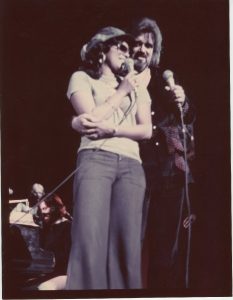
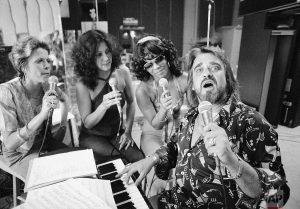
 Gwen asked her producers if they were really sure that “Angel” should be the first single, followed by a unanimous “yes”. Gwen says today that she never expected the song to be such a big hit. “After the song was released, the label wanted to have a finished album as soon as possible. At the same time, we were hoping to find a third member for the group. We had no idea what cultural background the singer should have. Irene was Mexican, but we did not necessarily look for a Mexican again.
We were sitting at our manager’s office when we all accidentally looked out the window and watched a woman walking across the street. I also do not remember what she was wearing, but her look was just amazing. Ed our manager just said if she is coming for the audition and sing can sing, she gets the job, she just looked amazing.
Gwen asked her producers if they were really sure that “Angel” should be the first single, followed by a unanimous “yes”. Gwen says today that she never expected the song to be such a big hit. “After the song was released, the label wanted to have a finished album as soon as possible. At the same time, we were hoping to find a third member for the group. We had no idea what cultural background the singer should have. Irene was Mexican, but we did not necessarily look for a Mexican again.
We were sitting at our manager’s office when we all accidentally looked out the window and watched a woman walking across the street. I also do not remember what she was wearing, but her look was just amazing. Ed our manager just said if she is coming for the audition and sing can sing, she gets the job, she just looked amazing. You know how the story ends, after we were complete as a trio, we went back to Muscle Shoals to finish the album. Juanita Curiel, who joined as the third member, can not be heard on the original version of “Angel in your Arms” but on the Spanish version of the song. As she was not yet a member of the group when the first version was recorded. I do not remember who had the idea, we learned that Juanita does not speak Spanish because we were hoping she could translate the song.
That’s why there were suddenly about 9 translators in the studio who translated the song for us. ”
When asked how Terry came to all the translators in Alabama in the 1970s, he said, “We have announced what we are looking for and many people came to the studio. It was exciting for them to be in a recording studio. At the time, HOT had a big hit and was HOT in the truest sense of the word. I still remember that the line “While you’re out of paintin ‘the town” made the most translation problems. Because this is a proverb.
You know how the story ends, after we were complete as a trio, we went back to Muscle Shoals to finish the album. Juanita Curiel, who joined as the third member, can not be heard on the original version of “Angel in your Arms” but on the Spanish version of the song. As she was not yet a member of the group when the first version was recorded. I do not remember who had the idea, we learned that Juanita does not speak Spanish because we were hoping she could translate the song.
That’s why there were suddenly about 9 translators in the studio who translated the song for us. ”
When asked how Terry came to all the translators in Alabama in the 1970s, he said, “We have announced what we are looking for and many people came to the studio. It was exciting for them to be in a recording studio. At the time, HOT had a big hit and was HOT in the truest sense of the word. I still remember that the line “While you’re out of paintin ‘the town” made the most translation problems. Because this is a proverb.
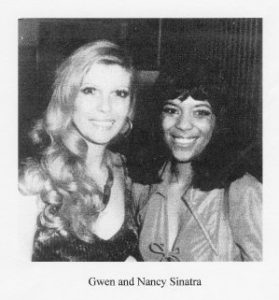 We paid everyone who helped $ 50. People did not do it for the money, but because they had a blast.
After all the recordings for the first album were completed, we then made the Spanish version.
After the release of the album, we went on tour and did some TV shows.
We had to record the albums so fast, we did not really have time to enjoy it. Before we knew it, we were back in the studio to record the second album. ”
When asked how we can imagine the time in the studio, says Gwen,
“You know, there were a lot of songwriters there and everyone was trying to get their songs on our album. We listened to the demos and I talked to Terry and Clayton. It did not matter which songs I chose, because they were all good. I’ve played them and tried to figure out which songs I can feel good with. Then the musicians recorded the backing tracks, we had no influence on the arrangements. The things we could control were the lead and background vocals.
We have all made background vocal arrangements for all our albums. At first I just went to the studio and recorded the background without consulting the producers. I thought I would go beyond the limits if I just do it without talking to them first. So there was a difference of opinion and the next day I waited until I should sing. The result was that I just heard, what are you waiting for? Sing the background! From then on, everyone understood that we knew what we were doing. ”
We paid everyone who helped $ 50. People did not do it for the money, but because they had a blast.
After all the recordings for the first album were completed, we then made the Spanish version.
After the release of the album, we went on tour and did some TV shows.
We had to record the albums so fast, we did not really have time to enjoy it. Before we knew it, we were back in the studio to record the second album. ”
When asked how we can imagine the time in the studio, says Gwen,
“You know, there were a lot of songwriters there and everyone was trying to get their songs on our album. We listened to the demos and I talked to Terry and Clayton. It did not matter which songs I chose, because they were all good. I’ve played them and tried to figure out which songs I can feel good with. Then the musicians recorded the backing tracks, we had no influence on the arrangements. The things we could control were the lead and background vocals.
We have all made background vocal arrangements for all our albums. At first I just went to the studio and recorded the background without consulting the producers. I thought I would go beyond the limits if I just do it without talking to them first. So there was a difference of opinion and the next day I waited until I should sing. The result was that I just heard, what are you waiting for? Sing the background! From then on, everyone understood that we knew what we were doing. ”
 As a woman in the 70s it was not easy in the music business. Not only that everyone thought the group would be like many groups and compiled solely for commercial reasons. “No, it was a coincidence how we came together and we were one of the first multicultural groups. And yes, we had to fight for our rights, especially Juanita had a hard time getting her songs on the albums. A few of her songs made it on our albums, but trust me, it was a tough fight to even consider our songs. ”
Gwen also has two songs on the first album, including “Why don`t you believe in your man” and “If you don’t love her” (The story behind this song, can be found in Part 1)
That’s how we got respect, we showed them that we’re not stupid women who had no idea in which key we had to sing, etc. We were very good educated musically and we knew how to write songs. ”
As a woman in the 70s it was not easy in the music business. Not only that everyone thought the group would be like many groups and compiled solely for commercial reasons. “No, it was a coincidence how we came together and we were one of the first multicultural groups. And yes, we had to fight for our rights, especially Juanita had a hard time getting her songs on the albums. A few of her songs made it on our albums, but trust me, it was a tough fight to even consider our songs. ”
Gwen also has two songs on the first album, including “Why don`t you believe in your man” and “If you don’t love her” (The story behind this song, can be found in Part 1)
That’s how we got respect, we showed them that we’re not stupid women who had no idea in which key we had to sing, etc. We were very good educated musically and we knew how to write songs. ”
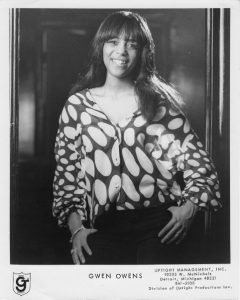 Why was there no follow up after three strong albums? Gwen says, “I do not know if I should tell you this story, but it was so long ago, why not. A singer at Columbia recorded the same song as a singer at our mother label Atlantic. And something happened back then that there was a legal dispute between Columbia and Atlantic and their respective singers. The singer who recorded at Atlantic, it was her first record, we were very sorry, because it would have been a hit. The song was also a hit for the male singer at Columbia.
During this dispute, however, everything that stood at promotion etc was stopped by Atlantic. This in turn led to a dispute with our producer and the Executive of Atlantic. The end of the story was that we were released from our contract. Therefore, there was no follow up after the three albums. So, whenever you hear that an artist has quit a contract for some unknown reason, the artist is mostly innocent of that fact, it’s the managers, the record bosses, etc., who decide on your career, not the artist himself. This lawsuit also buried the singer’s career at the same time.”
Why was there no follow up after three strong albums? Gwen says, “I do not know if I should tell you this story, but it was so long ago, why not. A singer at Columbia recorded the same song as a singer at our mother label Atlantic. And something happened back then that there was a legal dispute between Columbia and Atlantic and their respective singers. The singer who recorded at Atlantic, it was her first record, we were very sorry, because it would have been a hit. The song was also a hit for the male singer at Columbia.
During this dispute, however, everything that stood at promotion etc was stopped by Atlantic. This in turn led to a dispute with our producer and the Executive of Atlantic. The end of the story was that we were released from our contract. Therefore, there was no follow up after the three albums. So, whenever you hear that an artist has quit a contract for some unknown reason, the artist is mostly innocent of that fact, it’s the managers, the record bosses, etc., who decide on your career, not the artist himself. This lawsuit also buried the singer’s career at the same time.”
 Why did she record solo material in 1979?
“Our manager told our producers to record these songs. They did not tell the others girls and I should come to the studio and record my vocals to the songs. I suspect that they wanted to alienate me from the group to make me a solo artist. There was no reason for that. There was never a bad word in the group, or any other problems. Anyway, I recorded the songs, but I did not even know they were released until the day I saw them as a single some years ago. ”
When asked what she remembers from the 1980 movie, Gwen says, “I know that the script for the movie was done before we even talked about it. At first, the movie was only about two singers, then they expanded the script to 3 singers when we came into movie. ”
Why is there so less video recordings of HOT, Gwen wonders. She remembers being in many TV shows.
The next thing you hear from HOT dates back to 1982 and for a long time it was not clear if this was really a HOT single, or if only, as shown on the label, Juanita alone was involved in the recording. This is the single “Tonight” / “The Nights Are Not Enough”. Gwen confirms that this is a Hot single as both she, Cathy and Juanita have recorded this song including the B-side. (There are more demo songs from these sessions, which we have already covered extensively in Part 1 of the Hot Story)
Unfortunately, they were also unlucky with the new label Boardwalk. Shortly after signing the new contract, Hot and Neil Bogart’s wife ( Neil Bogart was the owner of Broadwalk ) sat in the briefing room to learn that Neil Bogart had died, but his wife was thrilled with the group. Plans were made, but the New York office stopped everything here, too. They had to figure out, how it should go on without the deceased boss. Because all the contracts with the bank and the lenders were with Neil and not his wife’s.
“The next thing we knew was that Broadwalk was closing and we were back without a label, where we could hardly wait to record a new album.
Cathy left the group and Juanita and I continued to record songs like “Home Again” by Phyllis Brown and “Woman to Woman”. (The song Woman to Woman is available on the album Hot Uncovered via cdbaby). With these and other songs, we then tried to get a new record deal. We replaced Cathy with Cathy Ornelas.
Why did she record solo material in 1979?
“Our manager told our producers to record these songs. They did not tell the others girls and I should come to the studio and record my vocals to the songs. I suspect that they wanted to alienate me from the group to make me a solo artist. There was no reason for that. There was never a bad word in the group, or any other problems. Anyway, I recorded the songs, but I did not even know they were released until the day I saw them as a single some years ago. ”
When asked what she remembers from the 1980 movie, Gwen says, “I know that the script for the movie was done before we even talked about it. At first, the movie was only about two singers, then they expanded the script to 3 singers when we came into movie. ”
Why is there so less video recordings of HOT, Gwen wonders. She remembers being in many TV shows.
The next thing you hear from HOT dates back to 1982 and for a long time it was not clear if this was really a HOT single, or if only, as shown on the label, Juanita alone was involved in the recording. This is the single “Tonight” / “The Nights Are Not Enough”. Gwen confirms that this is a Hot single as both she, Cathy and Juanita have recorded this song including the B-side. (There are more demo songs from these sessions, which we have already covered extensively in Part 1 of the Hot Story)
Unfortunately, they were also unlucky with the new label Boardwalk. Shortly after signing the new contract, Hot and Neil Bogart’s wife ( Neil Bogart was the owner of Broadwalk ) sat in the briefing room to learn that Neil Bogart had died, but his wife was thrilled with the group. Plans were made, but the New York office stopped everything here, too. They had to figure out, how it should go on without the deceased boss. Because all the contracts with the bank and the lenders were with Neil and not his wife’s.
“The next thing we knew was that Broadwalk was closing and we were back without a label, where we could hardly wait to record a new album.
Cathy left the group and Juanita and I continued to record songs like “Home Again” by Phyllis Brown and “Woman to Woman”. (The song Woman to Woman is available on the album Hot Uncovered via cdbaby). With these and other songs, we then tried to get a new record deal. We replaced Cathy with Cathy Ornelas.

Wishbone Recording Studio

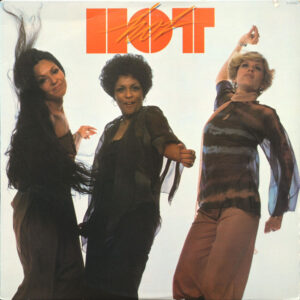


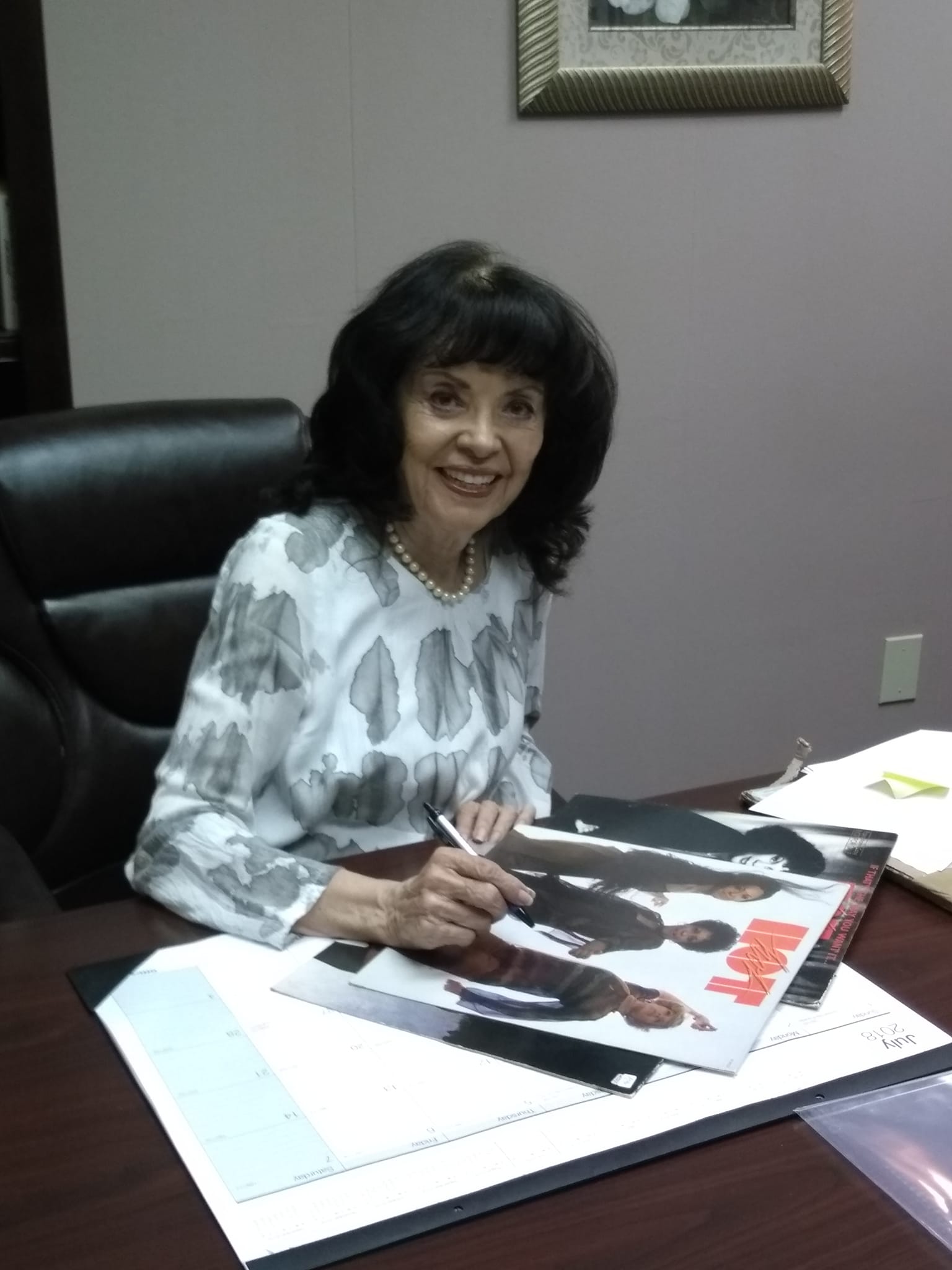

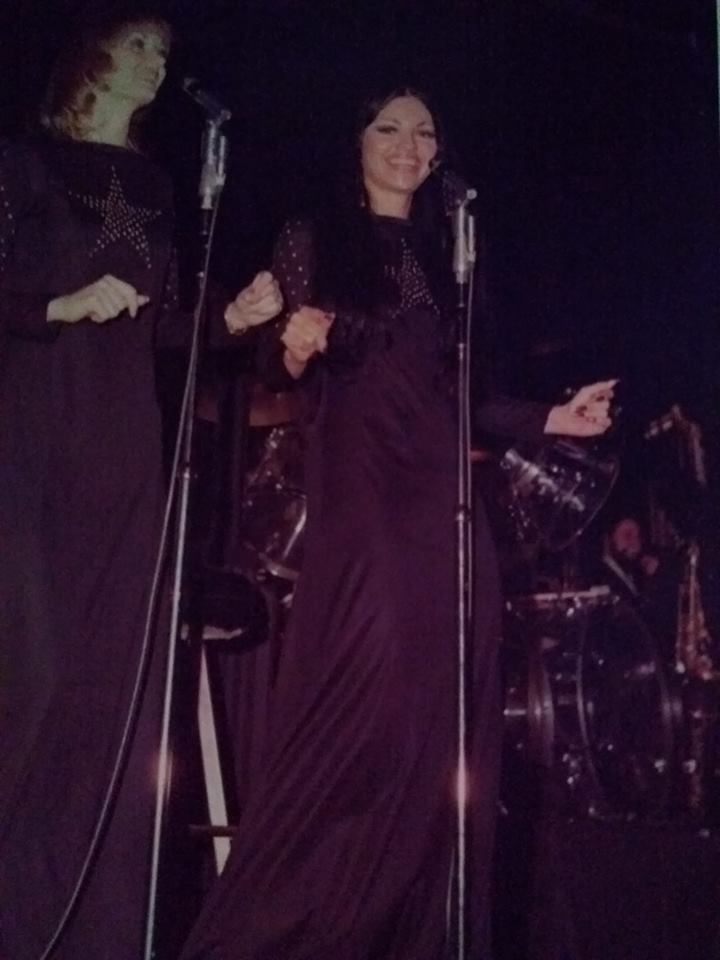





Donna Davis
Am 25.06 erblickte Donna Davis das Licht der Welt.
Musik war seit ihrer Geburt ein wichtiger Bestandteil ihres Lebens. Sie berichtet von einer Ohren OP, der sie sich als junges Kind unterziehen musste. Sie trug einen dicken Verband um den Kopf, aber sobald sie Musik hörte sprang sie auf und tanzte dazu „Singing was always on of my favorite things to do“.
Cynthia und ich waren „Roommates“ auf dem Collage und haben auf dem Campus gesungen. Als wir Pam 1975 trafen hatten wir noch keine Erfahrung im Musikbusiness. Pam war unser Einstieg, und was es für ein Einstieg es war.

Wir starteten mit einer 17 tägigen Session, wir hatten also einen richtig guten Anfang würde ich sagen.
Als ihren größten musikalischen Einfluss beschreibt sie nicht einen einzigen Künstler, sondern sagt dazu,“ wenn du in Detroit aufgewachsen bist war Motown „all around us“. Man hat es quasi geatmet. Ich habe auch kurz in der Poststelle von Motown gearbeitet und die 45 Singles verpackt, mein Vater war mit der Gordy Familie befreundet. Wenn man bei Hitsville USA vorbeigefahren ist konnte man die ganzen Stars sehen, wie sie draußen gewartet haben um drinnen aufnehmen zu können. Unser erster gemeinsamer Song war Sonny Munro „Open the door to your heart. Wochen nach der Session haben wir bei mir zu Hause geprobt und hörten das Sonny mit dem Song im TV auftreten wird. Also haben wir unsere Proben kurzgehalten und die TV Show gesehen. Das war das erste Mal, dass wir unsere Stimmen auf einer Aufnahme gehört haben. „That was the thrill.”
Gegen Ende 1976 sind wir richtig durchgestartet mit Platten, die Gold und Platin Status erreicht haben. Wir haben unsere Songs ständig im Radio gehört.
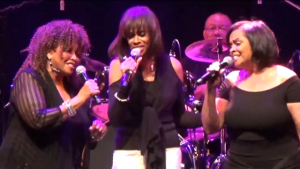
Was das Thema Royaltiies aus den Alben angeht sagt Donna,“ ja für Platten, die wir mit James Brown, Aretha Franklin und Johanny Taylor gemacht haben bekommen wir Geld. Aber bei dem Album Marilyn McCoo & Billy Davis, Jr. – I Hope We Get To Love In Time, welches ein Riesen Hit in den 70er Jahren war kriegen wir keinen Cent.
Auf Nachfrage wie das möglich ist, da sie ja auch auf dem Sleeve erwähnt sind also def. Credits erhalten haben, zeigte sich Donna sehr überrascht. Sie sagte Pam war damals in LA, wo das Album früher veröffentlich wurde als in Detroit, wo der Rest der Gruppe lebte und rief sie mitten in der Nacht an um ihr sagen, dass sie keine Credits bekommen haben. Was in diesem Fall für die Gruppe schwer wog, da sie die kompletten Vocal Arrangement für das Album vorgenommen hatten.
Auf die Frage, wie sie auf den Namen Brandye gekommen sind, sagt Donna, „ich weiß, dass wir eines Abends im United Sound Studio waren und einige Ideen für Namen hatten. Als wir das erste Mal zusammen kamen hatten wir den Namen Joy, aber auch irgendeinem Grund hat uns dieser Name nicht so gefallen. Als wir noch über die Namen grübelten kam Bootsy Collins rein, der Teil der Parliament/Funkadelic war, und wir fragten ihn welcher Name ihm am besten gefallen würde. Bootsy sagte „I like Brandye“ und so war unser Name geboren.
Wenn sie an die Aufnahmen mit Millie Jackson denkt sagt sie immer, dass sie es kaum abwarten konnte mit Millie zu arbeiten.
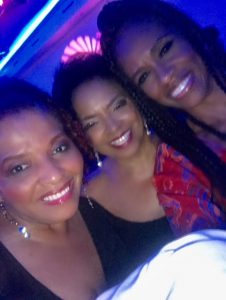
Ihre Tracks waren musikalisch gesehen immer sehr gut und es hat riesen Spaß gemacht mit ihr zu arbeiten. Sie hat uns sehr viel Freiheit gelassen, wenn es um die Arrangements der Backing Vocals ging. Body Movements ist einer meiner Lieblinssongs, den wir mit ihr aufgenommen haben.
Brandye ist ebenfalls auf dem Live Album „Live and Uncensored“ von Millies aus dem Jahr 1979 zu hören. Dazu meint Donna, „wir waren nicht mir ihr auf der Bühne. Ich denke sie war nicht ganz zufrieden mit den Backing Vocals und sie haben unsere Vocals dann im Studio nachträglich eingespielt“. Zu den Aufnahmen des James Brown Albums, für das sie nach LA eingeflogen wurden, sagt Donna, „James war nicht anwesend während wir aufgenommen wurden, aber er liebte die Backing Vocal so sehr, dass er uns mit auf Tour nehmen und uns die Brownetts nennen wollte.“
Sowohl Donna als auch Pam haben beide mit Aretha gearbeitet, aber erst nachdem Cynthia weggezogen ist.
Ein Highlight in der Zusammenarbeit mit Aretha war der Soundtrack zum Film Malcom X.
Als besondere Erinnerungen mit Aretha war ein Auftritt im Madison Square Garden bei den Democratic Convention, es war zu dem Zeitpunkt als Bill Clinton Präsident wurde.
Als Aretha Franklin in Detroit eine Aufnahme Session hatte, habe ich meinen Einsatz verpasst, weil ich so hingerissen von Aretha Franklin Vocals war. Ich konnte es einfach nicht glauben, dass ich hinter der First Lady of Soul stand. Aretha Franklin ist einer der wenigen Künstlerinnen, mit denen wir gearbeitet haben, die genau wusste was sie wollte und wie wir zu klingen hatten.
Zu Ronn Matlock ( Love City ) sagt sie, „er ist brillant, er ist sehr ruhig aber von dem Moment an, an dem sie die Tracks haben laufen lassen und wir seine Stimme gehört haben, dachte ich nur, Wow. Ich denke es ist sehr schade, dass seine Platten in den Staaten nie die Aufmerksam bekommen haben, die sie verdient hätten. Er ist ein großartiger Künstler und Songschreiber.
Kurz vor den Aufnahmen zu Crossover haben wir unseren ersten Vertrag für ein eigenes Album unterschrieben und wir waren nicht vertraut mit dem ganzen Prozess. Brad Shapiro kam nach Detroit mit einem ganzen Stapel Kassetten und brachte uns einige Songs, die seiner Meinung nach gut zu uns passen würden. Brad kannte uns als Background Sänger aber nicht als Main Act. Er hat auch nie unsere Show gesehen und wir mussten aus diesem Material wählen.
Der Zeitplan war sehr knapp, auch der Zeitpunkt, für den die Session angesetzt war stand schon fest und das Studio war gebucht. Keiner der Songs, die er uns vorgelegt hat traf wirklich unseren Style bzw. passte zu uns. Das heißt wir mussten das Material passend zu unserem Style machen, aber keiner der Songs wäre Material gewesen, welches wir selbst für uns gewählt hätten. Das heißt du bekommst endlich die Chance ein eigenes Album zu machen und hast dann Material mit dem du nicht wirklich glücklich bist. Was ungewöhnlich war, war, dass Brad uns nicht, nachdem wir Songs ausgesucht hatten, die Demos da gelassen hat um uns mit dem Material vertraut zu machen. Er nahm das Material wieder mit und sagte uns „ich möchte nicht, dass ihr so vertraut mit den Songs werdet, ich will dass ihr spontan seid wenn wir die Songs aufnehmen“.
Als wir in Nashville für die Aufnahmen gelandet sind haben wir auf der Fahrt zum Studio (Muscle Shoals) die Songs auf einem Kassetten Recorder gehört. So glücklich wir über den Umstand eines eigenen Albums waren, so unglücklich waren wir über das Material bzw. fanden es unpassend.

Über die Jahre ist das Album aber irgendwie mit uns verwachsen.
Mein Lieblingssong von allen Songs, die wir als Main Act gemacht haben, ist Rhythm of Love und wir haben erst vor kurzem erfahren, das der Songs in einigen Ländern ein Hit war. Wir überlegen sogar den Song neu aufzunehmen. Bei unseren Shows kommt der Song in einer Uptempo Version immer sehr gut an, er ist quasi das Highlight unserer Show.
Meine Tochter hat uns vor einiger Zeit ins Studio mitgenommen, sie ist selbst Songwriter und wir hoffen bald neues Material veröffentlichen zu können. Ihr Ehemann ist ein 5 facher Grammy Award Gewinner und er sah unsere Show in Las Vegas und war total begeistert. Das ist natürlich Musik in unsere Ohren. Er ist ein sehr bekannter Songwriter und wir hoffen, dass er etwas für Brandye schreiben wird.
Dass es kein Follow up zu Crossover gab erklärt Donna wie folgt, „Wir hatten einen Vertrag mit TK Records, ein Disco Lable, wir waren aber keine Disco Gruppe. Sie haben unser Album leider nicht so promoted wie wir es uns erhofft hatten. Und kurz bevor unser Album veröffentlicht wurde kam „Ring my Bell“ aus unserem Lable raus, was ein Monsterhit seinerzeit war. Die komplette Aufmerksamkeit des Labels galt neben KC and the Sunshine Band dann Anita Ward.

Im Jahr darauf zog Cynthia nach Kalifornien und der Moment ist einfach nicht mehr gekommen ein Follow up zu machen.
Letztes Jahr wollten wir nochmal wissen, ob wir es noch haben und es war großartig zu sehen, dass alles immer noch da war.
Ich liebe es mit den anderen zu arbeiten, wir kennen uns, wir sind wie Schwestern, es gab nie Streit und das soll in dem Business schon etwas heißen.
Auf die Frage welcher ihr Lieblingssong ist von den allen Songs die sie je aufgenommen hat, sagt Donna, „diese Frage kann ich nicht beantworten. Es waren ja mehr wie 4000 Songs, die wir aufgenommen haben. Ich mag einige, weil die Backing Vocals gut sind, andere mag ich, weil der komplette Song toll ist. Es ist einfach sehr schwierig. Als wir Disco Lady aufgenommen haben, der erste Song der jemals Platin erreicht hat, meinten wir zu David Shapiro du hast deinen Verstand verloren, shake it up shake it down, wir mochten diesen Teil einfach nicht und was passierte, es wurde einer der größten Hits der 70er Jahre.

Und dann hast du die Ronn Matlock Songs, die keine Hits waren und die Vocals sind einfach großartig. Also, wenn du mich so fragst zurzeit ist es „I can`t forget about you baby“ von Ronn.
Gibt es eine besondere Person oder eine Art Mentor den sie erwähnt haben will, dazu meint Donna, „Weißt du, die meiste Zeit haben wir die Vocals eingesungen und den Künstler nicht getroffen, da dieser seinen Teil schon eingesungen hat. Wir hatten nie viel Kontakt zu den Sängern, es waren unglaubliche Talente, die wie wir gerade auch am Anfang ihrer Karriere gestanden haben.
Wir haben eine Show mit Bob Hope gemacht und waren nicht so begeistert, er gehörte einer anderen Generation an und sprach auch eine andere Zielgruppe an. Aber als wir ihn dann kennengelernt haben änderte das unsere Meinung, er war so freundlich und hat und uns mit einer Umarmung begrüßt und in seine Garderobe eingeladen. Es war einfach großartig, dass ein Superstar wie er so einen Einfluss auf uns hatte.
Wir nahmen sein Angebot an nach der Show in seiner Garderobe vorbeizukommen. Aber da waren so viele Menschen, die alle einen sehr wichtigen Eindruck gemacht haben, da wollten wir ihn nicht stören. Er sah uns aber aus dem Augenwinkel und begrüßte uns herzlich. Er war wirklich freundlich.
Meine schönste Erinnerung rückblickend ist es mit den anderen auf Tour zu sein. Cynthia und ich waren Roommates im Collage, und wir haben diese Zeit einfach etwas verlängert. Es ist schön mit Menschen unterwegs zu sein mit denen du dich gut verstehst. Aber ganz ehrlich, ich bin sehr aufgeregt was gerade passiert, nach all den Jahren erinnern sich die Menschen noch an uns. Wir haben zwar viel Backing Vocals gemacht aber eben nur ein einziges Album als Main Act. Wir haben jetzt mehr Selbstvertrauen, unsere besten Zeiten liegen vor uns. Man sagt im Business immer, man ist so gut wie seine letzten Platte und ich denke unser großer Hit wird noch kommen.
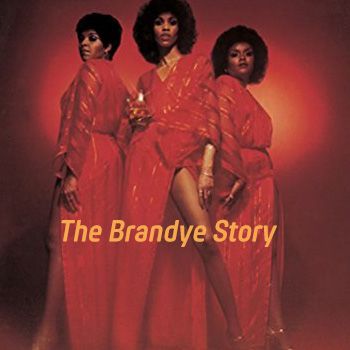
Jeder der Musik aus den 70ern bis hin zu Mitte der 80er hört hat mit Sicherheit schon einen Song mit Brandye gehört. Brandye ist sozusagen „The most Famous and unknown Vocal Group ever”.
Während ihrer Karriere haben sie mehr als 4000 Songs aufgenommen und unzählige Gold und Platinschallplatten errungen.
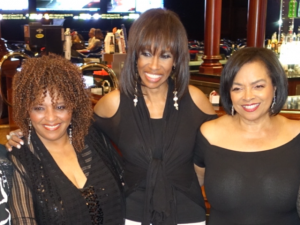
Brandye haben unter anderem mit Aretha Franklin, James Brown, Bob Seger, Johnnie Taylor, Parliament Funkadelic, Mavis Staples, Blackfoot, Bobby Womack, The Dramatics, Isaac Hayes und Millie Jackson aufgenommen und das ist nicht mal die Spitze des Eisbergs.
Besonders in den 70er und Anfang der 80er Jahre waren sie einer der gefragtesten Backing Vocal Groups.
Die Original Besetzung der 1975 in Michigan geründeten Gruppe, die auch bis heute noch Bestand hat ist Cynthia Douglas, Pamela Vincent and Donna Davis.
Dies ist Teil 1 ihrer Geschichte, die wir mit Pam Vincent, der Begründerin von Brandye beginnen.
Pamela Vincent wurde am 18.09 in Michigan geboren. Ihre Schwester Joyce (https://en.wikipedia.org/wiki/Joyce_Vincent_Wilson) ist ihr großes Vorbild, die mit der Gruppe Tony Orlando and Dawn schon seit Anfang der 70 Jahre große Erfolge feierte. Als Pam 15 war fing sie an mit ihrer Schwester im Studio zu arbeiten. Damals wurde noch eine Person für Backing Vocals gebraucht, die unter anderem für Tony Orlando oder Johnny Taylor genutzt werden sollte. Als ihre Schwester mit Tony auf Tour ging, suchte sie zwei Sängerinnen die Tony und ihre Schwester ersetzen damit sie weiter Backing Vocals machen konnten. Leider passten die, die sie fanden nicht wirklich.
Don Davis (https://en.wikipedia.org/wiki/Don_Davis_(record_producer), der ausführende Produzent für die meisten ihrer Aufnahmen sagte ihr nach einer Aufnahme session „you better find me some singers“ und Pam sagte „I`m trying“. Durch Diane Steinberg lerne sie Donna und Cynthia kennen.
Sie hörte sich also die Damen an, die seinerzeit aber zu dritt waren, es gab noch eine Sandy und sie klangen sehr gut zusammen, aber sie brauchte nur zwei Sängerinnen, da sie die tiefen Töne sang und die anderen beiden die mittleren- bzw. die hohen Töne singen sollten.
Einen Tag nachdem sie sie angehört hatte gab es einen Studiotermin, Sandy musste leider früher gehen, daher blieben sie zu dritt und es war die Geburtsstunde von Brandye. Pam sagte dazu „it was meant to be“. Pam, Donna und Cynthia waren vorher noch nie in einem Studio und waren komplett grün hinter den Ohren, aber vom ersten Song an passten ihre Stimmen einfach zusammen. Es war eine Session des Sängers Sonny Munro „Open the door to your heart ( https://www.youtube.com/watch?v=wgeK8xzgqZQ )/Tears make only make the problems wet ( https://www.youtube.com/watch?v=8kDB37MgHSE )“. Daraus wurde eine 17 tägige Aufnahme Session beginnend mit dem Tag an dem sie sie kennengelernt hatten ohne Pause. Während der ganzen Zeit arbeitete Pam in den 70ern auch mit Aretha Franklin und ging mit ihr auf Tour. Nach ihren Worten immer ein Back and Forth.
Im Juli bekam sie einen Anruf, mit der Bitte für eine Session. Mittlerweile hatte sie immer ihren Kalender dabei und musste dem Produzenten dann sagen „Sorry, wir haben erst wieder am 5 August etwas frei“. That`s how busy we were. Das war der Job, es ging non Stopp.
Den Produzenten Brad Shapiro (https://en.wikipedia.org/wiki/Brad_Shapiro) lernte sie kennen als Backgroundsängerinnen für Milli Jackson gesucht wurden.
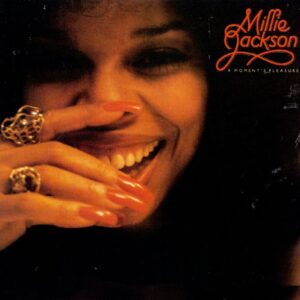 Über ihre Zusammenarbeit mit Millie Jackson sagt Pam:“ Mille sagt was sie denkt und es hat riesen Spaß gemacht. Jedes Mal, wenn ich an Millie denke muss ich daran denken wie sie in den 70ern im Studio war. Sie trug Jeans und einen Pelz Mantel, es waren die 70er und so einen Mantel hast du normalerweise nur in Kombination mit einem Abendkleid und Poems getragen, du warst „dressy“. Aber sie trug dazu Jeans und T-Shirt“.
Über ihre Zusammenarbeit mit Millie Jackson sagt Pam:“ Mille sagt was sie denkt und es hat riesen Spaß gemacht. Jedes Mal, wenn ich an Millie denke muss ich daran denken wie sie in den 70ern im Studio war. Sie trug Jeans und einen Pelz Mantel, es waren die 70er und so einen Mantel hast du normalerweise nur in Kombination mit einem Abendkleid und Poems getragen, du warst „dressy“. Aber sie trug dazu Jeans und T-Shirt“.
Für den James Brown Song „It`s too Funky in hear“ haben sie ebenfalls die Backing Vocal gesungen. Leider haben sie James Brown nie persönlich getroffen, denn als sie ins Studio kamen hatte James bereits die Leadvocal zu dem Track eingespielt.
Auch an dem ersten Song, der eine Platinschallplatte erhalten hat, „Disco Lady“ von Johnny Taylor (https://www.youtube.com/watch?v=-3JkEoQ0Cz8 ) waren Brandye als Backing Vocal Group beteiligt.
Meiner persönlichen Meinung nach ist es fraglich warum gerade dieser Song zu einem Megahit wurde, aber es waren die 70er
Brandye waren Brads erste Wahl. Nach der Aufnahme Session für Millie wurden sie laut Pam für alle Projekte des Studios gebucht. Gegen Ende der 70er Jahre fragte Brad ob die Gruppe nicht ein eigenes Album machen wollte.
Pam sagt: “Wir haben so viele Sessions gehabt, manchmal gehen wir online, hören uns bestimmte Tracks an und stellen fest, ja da haben wir auch gesungen“. Leider hat Pam alle ihre Aufzeichnungen über die Sessions an denen sie beteiligt war während eines Umzuges aus Detroit verloren.
„Don Davis gab uns immer die Tapes für die Sessions und wir haben die Arrangements in Cynthias Küche gemacht. Er musste nicht sagen ich will es so oder so, er sagte uns immer, ihr wisst was ihr tut, you girls have it I see you in the studio next Friday 3 o´clock“.
Es ergeht Brandye leider wie vielen Musikern aus den 70er/80er Jahren beim Thema Royaltiies. Sie bekommen nur für eine Handvoll von Aufnahmen Royalties. Zum Beispiel das Album Marilyn McCoo & Billy Davis, Jr. – I Hope We Get To Love In Time hat sich mehrere Millionen Mal verkauft, dafür bekamen sie keinen Cent, obwohl sie alle Background Vocal Arrangements gemacht hatten (siehe Linernotes der Platte).
Bezüglich der Aufnahmen zu ihrem Einzigen Album „Crossover“ erinnert sich Pam wie folgt:
“Es war Brads Idee und wir haben dieses Album in ein paar Tagen aufgenommen. Brad war auf der Suche nach Material für uns. Zu dieser Zeit haben wir keine eigenen Songs geschrieben, das kam erst nach dem Album. Wir haben also die Demos zu Songs bekommen und es waren nicht viele aus denen wir wählen konnten. Auf diesem Album gibt es keinen Song auf dem ich eine Leadstimme habe, denn ich fand nicht das es einen Song bei den Demos gab der zu meiner Leadstimme passte. Wenn ich die Möglichkeit heute haben würde, dann hätte ich einen Weg gefunden etwas für meine Stimme passend zu machen, aber damals war es anders. Wir sind also nach Nashville gefahren und waren sehr überrascht, dass die Band keine Noten las, sondern Nummern aufschrieben. (https://en.wikipedia.org/wiki/Nashville_number_system)
Wir haben die ganze Nacht aufgenommen und irgendwann bin ich während der Aufnahmen in der Soundbooth eingeschlafen. Es passierte alles sehr schnell, aber es war auch eine wunderbare Erfahrung sein eigenes Album zu machen.“
Auf die Frage ob sie einen Lieblingssong auf dem Album hat, sagt sie „you accuse me“. Nachdem sie das Album aufgenommen hatten gab es Live Auftritte in Detroit und die Zuschauer liebten diesen Song.
Ein weiterer Song, den sie sehr mag ist „I Love The Way You Love“, sie und Cynthia teilen sich bei diesem Song den hohen- und den tiefen Teil. Sie sagt es sei ja wie ein Leadvocal gewesen. „Man muss sich das so vorstellen, wir haben die ganzen Arrangements für die Songs auf dem Weg nach Nashville ausgearbeitet oder halt eben abends im Hotelzimmer, es war eben alles so schnell“.
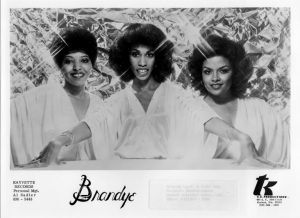 Auf die Frage ob sie Einfluss auf den Sound des Albums hatten sagt Pam: „Wir hatten nicht sehr viel Einfluss, es waren meistens Brad und die Musiker“.
Auf die Frage ob sie Einfluss auf den Sound des Albums hatten sagt Pam: „Wir hatten nicht sehr viel Einfluss, es waren meistens Brad und die Musiker“.
Als ich Pam sage, dass das a Kapella auf dem Album mein Favorit ist, sagt sie: “ja, es war unsere Idee, wir wollten möglichst viele Einflüsse auf dem Album unterbringen eben „Crossover“, etwas Country, etwas R&B, etwas Pop. Wir wollten unsere Harmonien zeigen“.
Warum gab es kein Follow up?
Sie waren bei dem Label TK, wo unter anderem KC and the Sunshine Band unter Vertrag standen und die kamen zu dieser Zeit richtig groß raus „larger than life“. Die Plattenfirma sah dort mehr Potenzial und hat ihre Energie, Promotion etc. in diese Band gesteckt. Es wurde ihnen nie ein Follow up Album angeboten.
Sie sind immer wieder erstaunt, wenn sie bei Auftritten oder via Social Media erfahren, dass ihr Album auch in Europa, Japan etc. verkauft wurde. „Wir konnte es nicht glauben, dass es das Album sogar auf CD gibt“.
(https://www.discogs.com/Brandye-Crossover-To-Brandye/release/9216835)
Sie bekommen aus den Verkäufen des Albums nicht einen Cent obwohl es ihre Solo Platte war. Wahrscheinlich verdient die Person, die die Mastertapes der Aufnahmen hatte das Geld, sie wissen es nicht.
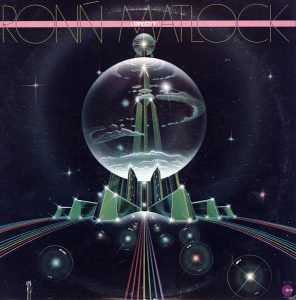 Ihre Arbeit mit Ronn Matlock (https://www.discogs.com/artist/394986-Ronn-Matlock ) (Love city) beschreibt Pam wie folgt: „Dieser Typ hatte eine der besten Stimmen die man sich vorstellen kann. Einen tiefen Bariton und er sah so gut aus, just a handsome man. Ich habe die Songs einfach geliebt. Und wenn ich sie heute höre, weiß ich, dass wir einfach großartige Arbeit geleistet haben“.
Ihre Arbeit mit Ronn Matlock (https://www.discogs.com/artist/394986-Ronn-Matlock ) (Love city) beschreibt Pam wie folgt: „Dieser Typ hatte eine der besten Stimmen die man sich vorstellen kann. Einen tiefen Bariton und er sah so gut aus, just a handsome man. Ich habe die Songs einfach geliebt. Und wenn ich sie heute höre, weiß ich, dass wir einfach großartige Arbeit geleistet haben“.
Auch bei David Ruffin`s Album Gentleman Ruffin (https://www.discogs.com/David-Ruffin-Gentleman-Ruffin/release/1403849) haben sie bei „ I wanna be with you“ die Backing Vocals eingesungen. Währenddessen war David Ruffin selbst nicht im Studio. Der Songschreiber hatte eine Demo Vocal eingesungen und dazu kam dann unser Backroundgesang. David hat dann später den Lead eingesungen. Auch für diese Aufnahmen bekamen sie keinen Cent.
„Für Parliament – Mothership Connection haben wir ebenfalls die Backing Vocals gemacht, da findest du meinen Namen in den Credits, Cynthia und Donna haben sie aber schlicht vergessen. Ich wurde dafür bezahlt, die anderen aber nicht, weil die Namen schlicht fehlten. Hinzukommt, dass wir damals Sessions gemacht haben ohne einen Vertag, wir wurden Cash bezahlt und fertig. Wir konnten damals nicht wissen, dass Disco Lady der erste Platin Hit wurde, und das war bei vielen Songs so“.
Was ist mit Brandye in den 80er passiert?
„Wir hatten nie Streit oder Schwierigkeiten. Cynthia war mit einem Arzt verheiratet, der eine Praxis übernahm, was bedeutete, dass sie umziehen musste. Das war 1980, Donna und ich waren am Boden zerstört. Wir mussten also Cynthia ersetzten, aber wir konnten keinen Ersatz finden der unseren Sound hatte. Unter anderem trafen wir Melody McCulley, die aber dann sehr schnell mit Stevie Wonder auf Tour ging. Diese wurde dann kurzfristig mit Pamela Lawson ersetzt. Es war also nie dasselbe. Wir haben aber nie den Kontakt verloren, wir waren enge Freunde. Wir wussten immer was im Leben der anderen passiert.
1984 bin ich dann nach Kalifornien gezogen zu meiner Schwester, da diese schwanger war. Sie hatten dort auch Vocal Groups, aber nicht vergleichbar mit Detroit“.
Wie ist es zur Réunion gekommen?
„Ich habe viel mit Donna telefoniert, die in Las Vegas lebte und nach vielen Gesprächen fragten wir uns ob wir nicht wieder etwas zusammen machen sollten. Also sprachen wir mit Cynthia ob sie nicht Lust hätte. Cynthia sagte, dass sie bald in Rente gehen wollte und nun Zeit hätte also dachten, wir los geht’s. Cynthia und ich sind regelmäßig nach Las Vegas geflogen um zu sehen ob wir es immer noch hatten, and we still got it“.
Sie sangen zusammen und es war so als würden nicht fast 30 Jahren dazwischen liegen, es war alles so wie früher.
Eine ihrer schönsten Erinnerungen ist eine TV Show mit Bob Hope. Sie haben für einen Act die Backvocals gemacht. Es sind so viele Memories.
Sie hat Tapes mit Arrangements für viele große Hits der 70er beim Garage aufräumen gefunden.
Wann wird es neues Material geben?
„Wir waren bereits im Studio und haben zwei Songs mit einem namhaften Produzenten aufgenommen. Es ist ein Luther Vandross Cover und Could I be dreaming von den Pointer Sisters. Die Aufnahmen sind einfach großartig und haben den Brandye Sound. Wir sind so stolz auf uns. Sobald wie möglich werden wir wieder im Studio sein“.
Bonus:
Pam & Joyce Vincent Interview KPR1 Radio